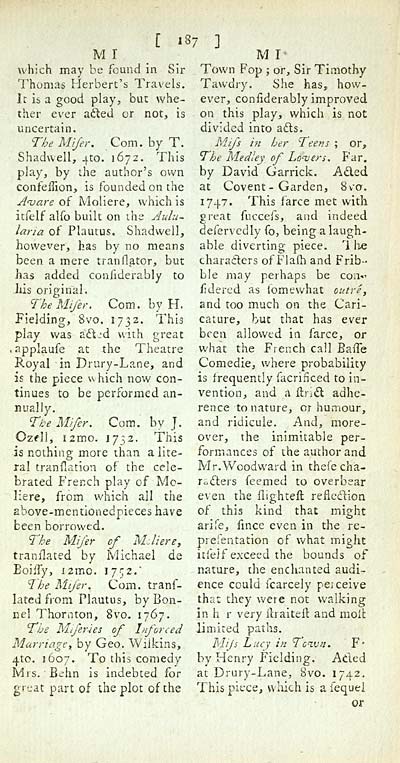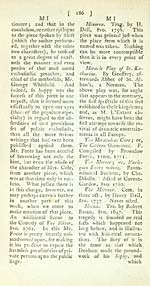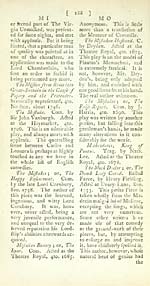Glen Collection of printed music > Printed text > New theatrical dictionary
(201) Page 187
Download files
Complete book:
Individual page:
Thumbnail gallery: Grid view | List view

[ Ifi
M I
which may be found in Sir
Thomas Herbert's Travels.
h is a good play, but whe-
ther ever a&ed or not, is
uncertain.
The Mifer. Com. by T.
Shadwell, 4C.0. 1672. This
play, by the author's own
confeilion, is founded on the
A<vare of Moliere, which is
itfelf alfo built on the Aulu-
laria of Plautus. Shadwell,
however, has by no means
been a mere translator, but
has added considerably to
.his original.
the Mifer, Com. by H.
Fielding, 8vo. 1732. This
play was adljd with great
. applaufe at the Theatre
Royal in Drury-Lane, and
is the piece which now con-
tinues to be performed an-
nually.
The Mifer. Com. by J.
Ozell, i2mo. 1752. This
is nothing more than a lite-
ral translation of the cele-
brated French play of Mo-
liere, from which all the
above-mentionedpieces have
been borrowed.
The Mifer of Moliere,
tranilated by Michael de
Boiffy, umc. 1752.'
The Mifer. Com. tranf-
lated from Plautus, by Bon-
nel Thornton, 8vo. 1767.
The Miferies of Iuforced
Marriage, by Geo. Wilkins,
4to. 1607. To this comedy
Mrs. Behn is indebted for
great part of the plot of the
7 ]
M I
Town Fop ; or, Sir Timothy
Tawdry. She has, how-
ever, confiderably improved
on this play, which is not
divided into a&s.
Mifs in her Teens ; or,
The Medley of Lovers. Far.
by David Garrick. Adled
at Covent - Garden, 8vo.
1747. This farce met with
great fuccefs, and indeed
defervedly fo, being a laugh-
able diverting piece. The
characters of Flafh and Frib-
ble may perhaps be con*'
fidered as Somewhat outre,
and too much on the Cari-
cature, but that has ever
been allowed in farce, or
what the French call BafTe
Comedie, where probability
is frequently Sacrificed to in-
vention, and a ftn£t adhe-
rence to nature, or humour,
and ridicule. And, more-
over, the inimitable per-
formances of the author and
Mr. Woodward in thefe cha-
T«£ters Seemed to overbear
even the Slightest reflection
of this kind that might
arife, fince even in the re-
presentation of what might
itfeif exceed the bounds of
nature, the enchanted audi-
ence could Scarcely peiceive
that they were not walking
in h r very itraiteil and molt
limited paths.
Mifs Lucy in Tcivn. F*
by Henry Fielding. Acled
at Drury-Lane, 8vo. 1742.
This piece, which is a Sequel
or
M I
which may be found in Sir
Thomas Herbert's Travels.
h is a good play, but whe-
ther ever a&ed or not, is
uncertain.
The Mifer. Com. by T.
Shadwell, 4C.0. 1672. This
play, by the author's own
confeilion, is founded on the
A<vare of Moliere, which is
itfelf alfo built on the Aulu-
laria of Plautus. Shadwell,
however, has by no means
been a mere translator, but
has added considerably to
.his original.
the Mifer, Com. by H.
Fielding, 8vo. 1732. This
play was adljd with great
. applaufe at the Theatre
Royal in Drury-Lane, and
is the piece which now con-
tinues to be performed an-
nually.
The Mifer. Com. by J.
Ozell, i2mo. 1752. This
is nothing more than a lite-
ral translation of the cele-
brated French play of Mo-
liere, from which all the
above-mentionedpieces have
been borrowed.
The Mifer of Moliere,
tranilated by Michael de
Boiffy, umc. 1752.'
The Mifer. Com. tranf-
lated from Plautus, by Bon-
nel Thornton, 8vo. 1767.
The Miferies of Iuforced
Marriage, by Geo. Wilkins,
4to. 1607. To this comedy
Mrs. Behn is indebted for
great part of the plot of the
7 ]
M I
Town Fop ; or, Sir Timothy
Tawdry. She has, how-
ever, confiderably improved
on this play, which is not
divided into a&s.
Mifs in her Teens ; or,
The Medley of Lovers. Far.
by David Garrick. Adled
at Covent - Garden, 8vo.
1747. This farce met with
great fuccefs, and indeed
defervedly fo, being a laugh-
able diverting piece. The
characters of Flafh and Frib-
ble may perhaps be con*'
fidered as Somewhat outre,
and too much on the Cari-
cature, but that has ever
been allowed in farce, or
what the French call BafTe
Comedie, where probability
is frequently Sacrificed to in-
vention, and a ftn£t adhe-
rence to nature, or humour,
and ridicule. And, more-
over, the inimitable per-
formances of the author and
Mr. Woodward in thefe cha-
T«£ters Seemed to overbear
even the Slightest reflection
of this kind that might
arife, fince even in the re-
presentation of what might
itfeif exceed the bounds of
nature, the enchanted audi-
ence could Scarcely peiceive
that they were not walking
in h r very itraiteil and molt
limited paths.
Mifs Lucy in Tcivn. F*
by Henry Fielding. Acled
at Drury-Lane, 8vo. 1742.
This piece, which is a Sequel
or
Set display mode to: Large image | Transcription
Images and transcriptions on this page, including medium image downloads, may be used under the Creative Commons Attribution 4.0 International Licence unless otherwise stated. ![]()
| Special collections of printed music > Glen Collection of printed music > Printed text > New theatrical dictionary > (201) Page 187 |
|---|
| Permanent URL | https://digital.nls.uk/90317777 |
|---|
| Description | Scottish songs and music of the 18th and early 19th centuries, including music for the Highland bagpipe. These are selected items from the collection of John Glen (1833 to 1904). Also includes a few manuscripts, some treatises, and other books on the subject. |
|---|
| Description | The Glen Collection and the Inglis Collection represent mainly 18th and 19th century Scottish music, including Scottish songs. The collections of Berlioz and Verdi collected by bibliographer Cecil Hopkinson contain contemporary and later editions of the works of the two composers Berlioz and Verdi. |
|---|

